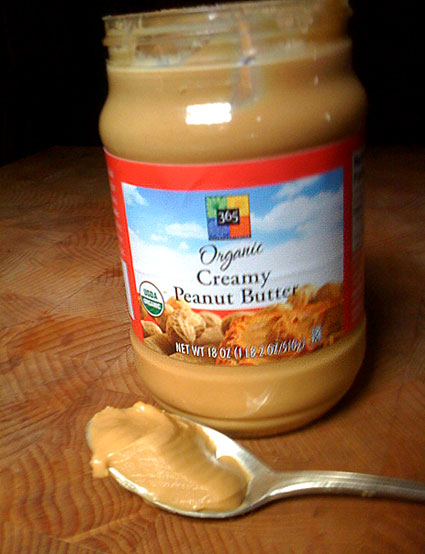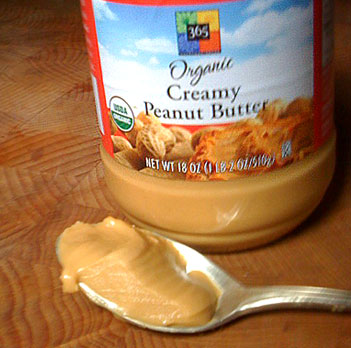 Oh, the disappointment.Confession: I have a thing for peanut butter. If my girlfriend didn’t tease me about the habit, I’d probably have toast with peanut butter and honey as “second breakfast” nearly every day. Goes so well with coffee …
Oh, the disappointment.Confession: I have a thing for peanut butter. If my girlfriend didn’t tease me about the habit, I’d probably have toast with peanut butter and honey as “second breakfast” nearly every day. Goes so well with coffee …
But anyway! So, I usually procure my peanut butter just like any other good hippie: from one of those grinding contraptions at the health-food store. That way, you know exactly what’s in it — peanuts, maybe salt — and it comes with the oil fully incorporated, unlike jarred “natural” peanut butters, whose oil separates from the paste.
Every once in a while, I succumb to the jarred stuff when an organic brand’s on sale. I like the saltiness of the jarred stuff. Soooo good.
Recently, I found myself at a Whole Foods. While looking for something else — really! — I encountered a display of Whole Foods 365 brand organic creamy peanut butter. On sale. For a really low price. So I threw a jar in my cart and went about my business.
Flash forward to this very morning, at the first rumblings of hunger after an early smoothie breakfast. With great anticipation, a piece of bread in the toaster and the honey pot at the ready, I opened the new jar of Whole Foods peanut butter. I was girded for the small inconvenience of having to reincorporate the separated oil back into the paste. The reward would be heaven on bread: sweet, salty, toasty, peanutty.
But everything was wrong. Instead of a half-inch of oil at the top, a grotesque sheen taunted me. You know, like the commercial crap, the stuff Big Food tarts up with added fat to make it uniform and, well, reliably creamy. And sugar, following the general Big Food law that Everything Must Be Sweetened.
Shocked by the industrial look of my organic peanut butter, I checked the ingredients, something I don’t always do when buying organic products:
Organic dry-roasted peanuts, organic palm oil, organic pure cane sugar, sea salt.
What? Compare that to the ingredients of Jif:
Made from roasted peanuts and sugar. Contains 2% or less of: molasses, fully hydrogenated vegetable oils (rapeseed and soybean), mono and diglycerides, salt.
In other words, taking its cue from the junk-food industry, Whole Foods is tarting up its organic peanut butter with added fat and sugar.
And you know what? It sucks. It’s skin-crawlingly unctuous, and the roast-peanut flavor is muted. It’s not peanut butter, it’s “peanut butter.” It panders to the taste of kids whose palates have been brutalized by Big Food’s legion of flavor engineers.
Whole Foods ruined my second breakfast, and I’m furious.
And it’s not just ruining the peanut-butter-and-honey sandwiches of the unwitting. It also may be ruining their hearts. According to a 2009 study funded by the USDA’s Agricultural Research Service, palm oil is just as bad for you as the trans fats it often replaces. And while I’m relieved that the palm oil in Whole Foods peanut butter is organic, I try to avoid palm products altogether, because palm production is pretty much an unmitigated ecological disaster.
Note that not every alternative grocery chain degrades it peanut butter. I am looking at an empty jar of Trader Joe’s organic peanut butter. Its ingredient list is short, rigorous, and correct: “organic dry-roasted unblanched Valencia peanuts, salt.” It’s also delicious.
Moral of the story: never neglect to read ingredients, even when you’re shopping in Whole Foods, even when what you’re buying is organic. For my future peanut butter needs, it’s back to the grinding contraption at the back of the health-food store. Memo to Whole Foods in Winston-Salem, N.C.: expect a man in a hat at the front desk soon, politely insisting on getting his money back for an open, barely consumed jar of organic “peanut butter.”




